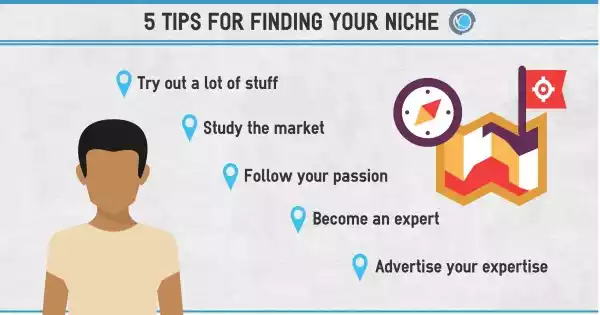In the vast world of blogging, finding your niche is the key to success. It’s like discovering a hidden treasure chest filled with loyal readers, increased traffic, and endless possibilities. So, if you want to take your blog to new heights, it’s time to embark on a journey toward maximizing its potential with a carefully crafted niche.
What exactly is a niche, you ask? Well, think of it as your blog’s unique selling proposition. It’s the special ingredient that sets you apart from the sea of generic content out there. Your niche defines your blog’s personality, its purpose, and its target audience. By focusing on a specific area or market, you can tailor your content to meet the needs and interests of a particular group of readers, establishing yourself as an authority and attracting a dedicated following.
Imagine having a blog that caters to the exact desires and cravings of your audience. With a well-defined niche, you can create content that resonates deeply with your readers, offering them valuable insights, solutions to their problems, or simply entertaining and inspiring stories. By addressing their specific needs, you’ll build trust, foster engagement, and keep them coming back for more. Let’s Discover the key to blogging success, a well-defined niche, set ourselves apart from the competition, attract loyal readers, and unlock endless possibilities.

Niche: Maximize Your Blog’s Potential In 2023
Why it is important?
But why is a niche so crucial for blog success? Well, consider this analogy, would you rather have a tiny fish in a vast ocean or be the big fish in a small pond? By targeting a niche, you position yourself as the expert in that particular field, allowing you to stand out and be noticed. It’s like having a spotlight shining brightly on you, while others fade into the background. A niche gives your blog direction, focus, and a clear purpose, making it easier for both search engines and readers to understand and appreciate what you have to offer.
Identifying and defining a niche is important for several reasons. Firstly, it helps businesses and individuals to focus their efforts and resources on a specific market, which can increase the chances of success.
Secondly, it allows them to differentiate themselves from competitors, which can lead to increased customer loyalty and higher profitability.
Finally, a well-defined niche can help to establish a strong brand identity and reputation, which is crucial for long-term success in any industry. In this article, we will explain Maximize Your Blog’s Potential with a Niche-A Beginner’s Guide
How to Choose a Niche

Choosing a niche for your blog is a crucial decision that will shape the direction of your content and the audience you attract.
Here are some strategies to help you make the right choice:
I. Identify your passions and interests:
Start by brainstorming a list of topics you are truly passionate about and know about. Consider your hobbies, experiences, or areas of expertise. Choosing a niche aligned with your passions ensures that you will enjoy writing about it and remain motivated in the long run.
Example:
If you love fitness and have extensive knowledge of nutrition, you could consider a niche blog focusing on healthy eating and wellness tips.
II. Research the market:
Before settling on a niche, conduct thorough market research to understand what’s popular and in demand. Look at other bloggers within your potential niche and analyze their content, engagement levels, and audience size. This research will provide insights into what works and what gaps you can fill with your unique perspective.
Example:
If you’re interested in travel blogging, research successful travel bloggers to identify areas that haven’t been extensively covered or discover new angles to explore.
III. Consider your target audience:
Define your target audience and consider their needs and interests. Think about who you want to connect with through your blog and what value you can offer them. Understanding your target audience helps you tailor your content specifically to their preferences and establish a loyal following.
Example:
If you want to target young professionals interested in personal finance, you could create a niche blog providing practical tips for budgeting, investing, and financial planning.
IV. Assess your competition:
Analyze the competition within your potential niche and determine if you can offer something unique and valuable. Look for gaps in content, different angles to approach topics or ways to provide a fresh perspective. Differentiating yourself from competitors will help you stand out and attract a dedicated audience.
Example:
If you’re considering a niche blog about sustainable living, research existing blogs and find ways to showcase innovative eco-friendly products, DIY projects, or personal experiences that set you apart.
V. Evaluate monetization opportunities:
While not the most crucial factor, it’s important to consider the potential for monetization in your chosen niche. Explore opportunities like affiliate marketing, sponsored content, or advertising. Assess whether your niche has a viable market for generating income that aligns with your long-term financial goals.
Example:
If your niche revolves around vegan cooking, you could explore partnerships with vegan food brands or create e-books or online courses to monetize your expertise.
By carefully considering these factors—your passions, market research, target audience, competition, and monetization opportunities—you can confidently choose a niche that aligns with your interests, has growth potential, resonates with your desired audience, and sets you up for success in the blogging world.
How to Conduct Thorough Research on Niche
Once you have identified your niche, it’s time to dive deep into research. Explore the existing blogs and websites within your chosen niche. Study their content, audience engagement, and the gaps you can fill. What unique perspective or value can you bring to the table? Remember, your goal is not to imitate, but to differentiate yourself. Find your voice, your style, and infuse it into every piece of content you create.

Once you have identified your niche, the next step is to conduct in-depth research to gain a deep understanding of the existing landscape.
Here’s how you can effectively dive into research and differentiate yourself within your chosen niche:
I. Explore existing blogs and websites:
Start by immersing yourself in the world of blogs and websites that revolve around your chosen niche. Look for established platforms, influential bloggers, and authoritative websites. Take note of their content, writing style, and topics they cover. This will give you a sense of what’s already out there and help you identify gaps and opportunities for your unique contribution.
For instance, if you’re entering the fashion niche, explore popular fashion blogs, fashion magazines, and influential fashion influencers to see what kind of content they produce and how they engage with their audience.
II. Study content and audience engagement:
Analyze the content published by other bloggers or websites within your niche. Pay attention to the types of articles, videos, or other formats they use to communicate with their audience. Study their engagement metrics, such as comments, social media shares, and likes. This analysis will provide insights into the topics and approaches that resonate with the audience and generate high engagement.
For example, if you’re interested in starting a technology blog, observe which technology-related articles receive the most comments and shares, indicating a strong interest among the audience.
III. Identify gaps and unique value:
While exploring existing content, be on the lookout for gaps or areas where you can provide unique perspectives or value. Look for topics that are underrepresented or haven’t been extensively covered. Consider how you can offer a fresh take, share your personal experiences, or provide practical solutions to the challenges faced by your target audience.
Let’s say you want to establish a niche blog focused on personal development. After conducting research, you might discover that there’s a lack of content catering specifically to introverts and their unique personal growth journeys. This could be an opportunity for you to create content tailored to the needs and interests of introverts, offering valuable insights and strategies that resonate with that specific audience.
IV. Differentiate yourself:
While it’s essential to learn from existing blogs, your goal is not to imitate them but to differentiate yourself. Find your voice and style that aligns with your personality and resonates with your target audience. Infuse your unique perspective, experiences, or expertise into every piece of content you create. This will help you stand out and attract a dedicated following.
For instance, if you’re passionate about cooking and your niche is healthy eating, you could differentiate yourself by incorporating your cultural heritage into your recipes and sharing personal anecdotes that connect with your readers on a deeper level.
Remember, the key is to offer something valuable and distinct that sets you apart from others in your niche. By conducting thorough research, identifying gaps, and infusing your unique perspective and style, you can carve out your own space within your chosen niche and create content that resonates deeply with your audience.
How to Maximize Your Blog’s Potential With Chosen Niche
To maximize your blog’s potential with a niche, consistency is key. Regularly publish high-quality, insightful, and engaging content that speaks directly to your target audience. Utilize various content formats, such as articles, videos, podcasts, or infographics, to cater to different preferences. Stay active on social media platforms and engage with your readers to foster a sense of community and build meaningful connections
To maximize your blog’s potential within your chosen niche, consistency plays a vital role.
Here’s how you can effectively leverage consistency to enhance your blog’s success:
I. Regularly publish high-quality content:
Consistently delivering valuable, high-quality content is essential. Stick to a consistent publishing schedule to keep your audience engaged and coming back for more. Create a content calendar to plan your topics, ensuring a steady flow of fresh and relevant content. By consistently providing informative, insightful, and well-researched articles, you establish yourself as a reliable source of information within your niche.
For example, if you run a photography blog, commit to publishing a new article or tutorial every week, covering various aspects of photography like composition techniques, editing tips, or equipment reviews.
II. Cater to different content formats:
Recognize that your audience may have diverse preferences when it comes to consuming content. Utilize a variety of formats, such as articles, videos, podcasts, or infographics, to cater to different learning styles and preferences. This flexibility allows you to engage with a wider audience and provide them with content in their preferred format.
For instance, if you have a fitness blog, you can create written articles featuring workout routines, instructional videos demonstrating proper form, or podcast episodes discussing nutrition and wellness tips.
III. Stay active on social media platforms:
Social media platforms are powerful tools for promoting your blog and connecting with your audience. Establish a strong presence on platforms relevant to your niche, such as Facebook, Instagram, Twitter, or LinkedIn. Share snippets of your content, engage with your followers and participate in discussions related to your niche.
For example, if your blog focuses on personal finance, you can share budgeting tips on Twitter, post inspiring quotes related to financial independence on Instagram, and engage in discussions about investment strategies on LinkedIn.
IV. Engage with your readers:
Foster a sense of community and build meaningful connections with your readers by actively engaging with them. Respond to comments on your blog posts, answer questions, and encourage discussions. This interaction helps create a loyal following, as your audience feels valued and heard. Additionally, consider incorporating their feedback and suggestions into your future content to further enhance their experience.
For instance, if you run a travel blog, respond to comments from readers who share their own travel experiences or seek recommendations. Engaging in conversations with your audience helps create a sense of community and encourages them to keep coming back.
By consistently publishing high-quality content, utilizing various content formats, staying active on social media, and engaging with your readers, you create a dynamic and interactive blogging experience. This approach builds a strong relationship with your audience, establishes your authority within your niche, and maximizes your blog’s potential for success.
How to Embracing Your Niche
Don’t underestimate the power of a well-defined niche when it comes to the success of your blog. By identifying and maximizing your blog’s potential with a niche, you’ll unlock a world of opportunities, attract the right readers, gain authority, and take your blog to soaring heights. So, embrace your niche, let your creativity flourish, and watch your blog thrive like never before!
By honing in on a specific niche and maximizing its potential, you open up a world of opportunities for your blog.
Here’s why embracing your niche is essential:
I. Attract the right readers:
A well-defined niche allows you to target a specific audience that resonates with your content. By catering to the interests and needs of your target audience, you naturally attract readers who are genuinely interested in what you have to offer. These readers are more likely to engage with your content, share it with others, and become loyal followers.
II. Gain authority and expertise:
Focusing on a niche enables you to develop a deep understanding of the subject matter. As you consistently create valuable content within your niche, you establish yourself as an authority and expert in that field. This positions you as a go-to resource, building trust and credibility among your readers.
III. Unlock growth opportunities:
When you specialize in a niche, you can tap into specific growth opportunities. By catering to a specific audience, you can collaborate with relevant brands, explore partnerships, and monetize your blog through targeted advertising, sponsored content, or product recommendations. Additionally, you can identify niche-specific trends and capitalize on them, further expanding your reach and influence.
IV. Stand out from the competition:
Embracing a niche allows you to differentiate yourself from the vast sea of generic content. By providing a unique perspective, valuable insights, or specialized knowledge within your niche, you set yourself apart from competitors. This differentiation helps you capture the attention of your target audience and build a distinct brand identity.
So, let your creativity flourish within your chosen niche. Experiment with innovative content ideas, explore different angles and offer a fresh take on topics within your expertise. As you consistently deliver high-quality content that speaks directly to your target audience, you’ll witness your blog thriving like never before.
Embrace your niche, leverage its potential, and watch as your blog attracts the right readers, gains authority, and reaches new heights of success. By wholeheartedly committing to your niche, you’ll unlock a world of possibilities and propel your blog toward remarkable achievements.
Best Sites or Platforms To Choose A Niche For a Blog

I. Google Trends:
Google Trends is a free tool that can help you identify popular topics and trends in your potential niche. You can use it to see how the search volume for a particular topic has changed over time and to compare the popularity of different topics.
II. Amazon:
Amazon is a great resource for researching your niche, especially if you plan to monetize your blog through affiliate marketing. You can use it to identify popular products in your niche and to read reviews to gain insights into the needs and interests of your target audience.
III. Buzzsumo:
Buzzsumo is a content research tool that can help you identify popular content in your niche. You can use it to find the most shared and engaged-with content on social media and to see which topics are generating the most buzz.
IV. Quora:
Quora is a Q&A platform that can help you identify questions and topics that are popular in your potential niche. You can use it to find out what people are asking about and to gain insights into the needs and interests of your target audience.
V. Reddit:
Reddit is a social news aggregation and discussion platform that can help you identify popular topics and trends in your niche. You can use it to see what people are talking about and to gain insights into the needs and interests of your target audience.
Best Tools, Sites, or Platform To Help Various Aspects Of Blogging

I. WordPress:
WordPress is the most popular content management system (CMS) for blogging. It’s easy to use, flexible, and offers a wide range of customization options. It also has a huge community of users and developers, which means there are many plugins and themes available to enhance your blog.
Google Analytics is a free tool that provides valuable insights into your blog’s traffic and audience. It can help you track metrics such as page views, bounce rate, and demographics, and can provide insights into which content is resonating with your audience.
III. Yoast SEO:
Yoast SEO is a popular WordPress plugin that helps you optimize your blog for search engines. It offers a range of features such as content analysis, meta tag optimization, and XML sitemap creation, to help improve your blog’s visibility in search results.
IV. Canva:
Canva is a graphic design tool that can help you create beautiful images and graphics for your blog. It offers a wide range of templates and design elements and is easy to use even if you have no design experience.
V. Hootsuite:
Hootsuite is a social media management tool that can help you manage your blog’s social media presence. It allows you to schedule posts, monitor mentions and engagement, and track analytics across multiple social media platforms.
Site To Find Keywords, Keyword Difficulties, And Analyze Site Traffic

I. Google Keyword Planner:
Google Keyword Planner is a free tool that allows you to find keywords related to your topic and see their search volume, competition level, and suggested bids for advertising. This tool is particularly useful for finding long-tail keywords and assessing their difficulty.
II. SEMrush:
SEMrush is a powerful keyword research tool that provides detailed data on keyword difficulty, search volume, and related keywords. It also allows you to track your website’s ranking for specific keywords and analyze your competitors’ websites.
III. Ahrefs:
Ahrefs is a comprehensive SEO tool that provides detailed data on keyword difficulty, search volume, and related keywords. It also allows you to analyze backlinks, track rankings, and perform site audits.
IV. Moz Keyword Explorer:
Moz Keyword Explorer is a keyword research tool that provides detailed data on keyword difficulty, search volume, and related keywords. It also allows you to assess the potential for ranking on the first page of search results for specific keywords.
V. SimilarWeb:
SimilarWeb is a tool that provides data on website traffic, engagement, and referrals. It can help you analyze your competitor’s websites and find new sources of traffic for your website.
Can you be more specific about the content of your article? After reading it, I still have some doubts. Hope you can help me.
Yeah tell me, sure will try to help
Good day! Do you know if they make any plugins to help with
Search Engine Optimization? I’m trying to get my blog
to rank for some targeted keywords but I’m not seeing
very good results. If you know of any please share.
Cheers!
Also visit my blog :: vpn special coupon code 2024
Thanks to my father who told me regarding this blog,
this website is really amazing.
Visit my web site … vpn coupon 2024
Hi Dear, are you truly visiting this site daily, if so then you
will without doubt take nice experience.
My page :: vpn code 2024